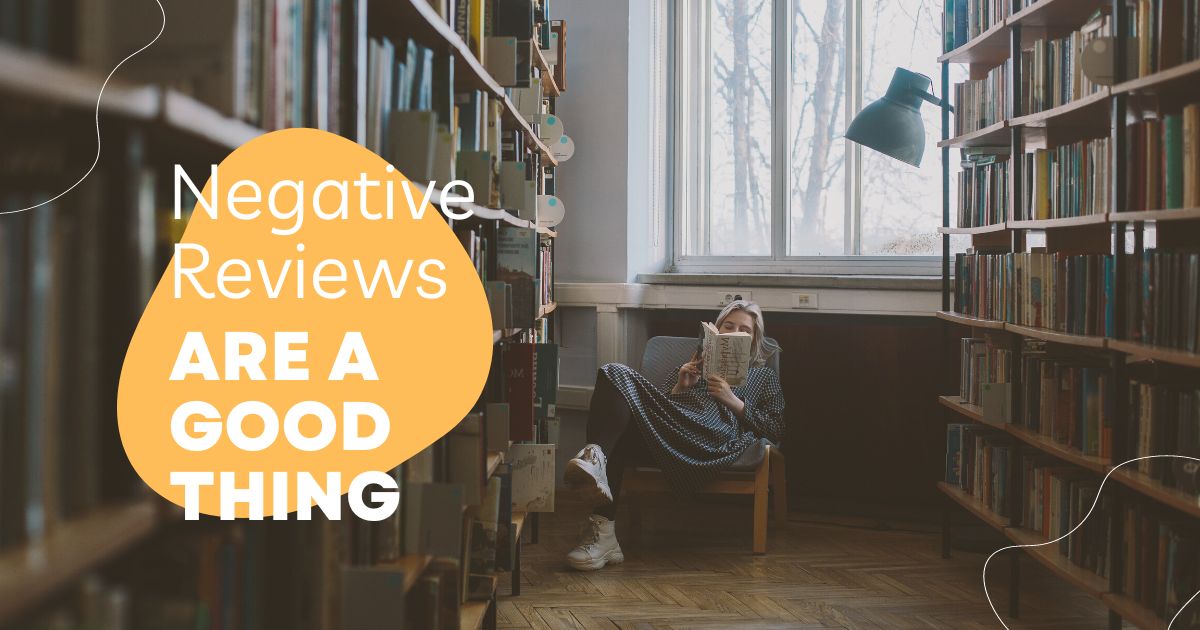There has been some conversation online recently about negative book reviews. This isn’t the first time (as evidenced by a 2014 NY Times article on this same topic), but the cultural zeitgeist always seems to circle back around to the idea that it’s bad to leave bad reviews.
As social media has blurred the lines between reviewers and authors, some of the debate has also revolved around authors actually responding to reviews, or worse: authors lashing out at people who leave negative reviews (also not a new topic). I want to be clear: this is unprofessional, unreasonable, and absolutely wrong.
There needs to be space for negative reviews. Because here’s the deal – negative book reviews are a GOOD thing.
Here are a few reasons every book needs negative reviews:
1. Negative reviews provide a balanced perspective
Positive reviews are important, of course, but they may reflect the opinions of only a select group of readers. Positive and negative reviews together can give potential readers a more realistic perspective of what to expect from a book.
2. Negative reviews help other readers make informed decisions
Everyone has preferences, and a reader may want to make sure they’ll enjoy a book before picking it up. Negative reviews can give someone a better idea if it’s for them.
For example, let’s say there’s a book that’s really character-driven and not plot-driven. It will probably be really popular amongst character-driven story fans, but really unpopular among plot-driven story fans. Therefore, a plot-driven person will learn from the negative reviews that it’s not for them, while the character-driven person will learn that it is for them. See?
I have given a book 2 stars, but then recommended it to someone else because I knew they’d like the things I did not.
3. Negative reviews encourage critical thinking
Let’s be honest, a glowing review is nice. But negative reviews can allow someone to think critically about a book and form their own opinions, rather than relying solely on the opinions of others.
I love reading negative reviews after I finish a book because it gives me a chance to internally defend my opinions before I leave my own review. If I disagree with another review, I must ask myself why, and then try to answer it in my review. That was my basis for this article.
4. Negative reviews can create authenticity for books
I’m more suspicious of books with no negative reviews than I am of the books with mixed opinions. The presence of negative reviews alone suggests that a book is not perfect, and has flaws just like any other. It’s up to the reader to decide if it’s good.
Conversely, here are all the things book reviews are NOT:
- Book reviews are not validation for authors. Book reviews are for other readers, not authors.
- Book reviews are not feedback for authors. Authors’ feedback comes from editors and beta readers, not reviewers. Again, book reviews are for other readers.
- Negative reviews for books you love are not personal attacks. We all have tastes and preferences.
- Book reviews are not above honesty. Just because an author put a lot of time and effort into something doesn’t mean they reserve the right to only positive reviews. They should encourage honest feedback, even if that feedback is negative.
Book reviews are essentially free marketing labor.
Be kind to reviewers – even when you disagree. All press is good press, and negative reviews help a book to find its target audience.
Check out some of my other recent blogs:








One response to “A Case for Negative Book Reviews”
Yes, a thousand times yes!!